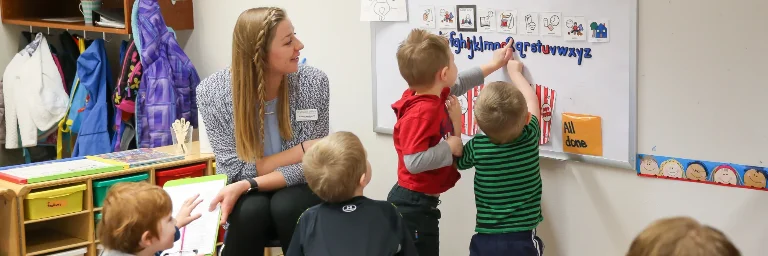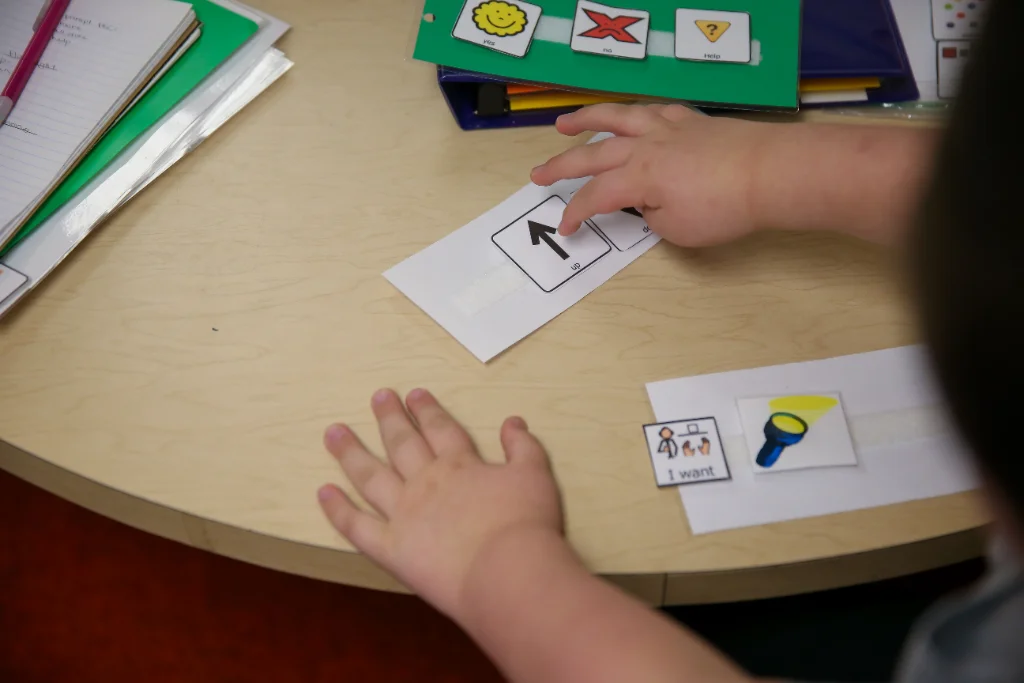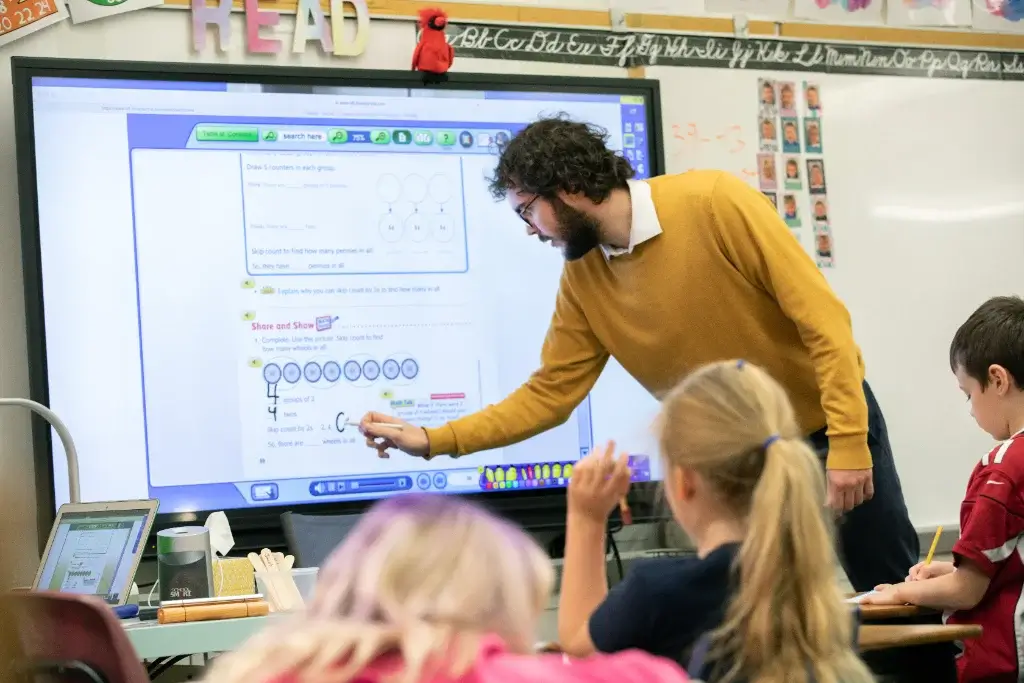
Special Education Teacher Skills
To be a good teacher, one needs much more than just basic subject knowledge and pedagogy—especially in special education.
Request Information
Students rely heavily on their teachers to guide them, support their learning, and help them navigate the challenges of academic life. For special education students, who face even more hurdles than the average student, the role of the teacher becomes even more critical. Ensuring these students receive the best possible education requires a unique set of special education teacher skills and a deep understanding of their needs. So, let's see what these skills are and how one can develop them in order to create a supportive and effective learning environment.
What is Special Education?
Special education is a specialized branch of education tailored to meet the unique needs of students with disabilities or special needs. It involves designing and implementing personalized instructional programs and providing necessary support services to ensure these students can access and benefit from an education that suits their abilities and learning styles. Special education aims to address specific challenges and barriers, enabling students to achieve academic success, develop essential skills, and reach their full potential.
Essential Skills for Special Education Teachers
Below, we'll explore some of the most important skills of a special education teacher. By mastering these skills, special education teachers can create effective and nurturing learning environments and ensure their students receive the best support and education.
Patience
Patience is fundamental for special education teachers as they often work with students who require more time to understand and complete tasks. These students may have learning disabilities, behavioral challenges, or other special needs, making traditional teaching methods less effective. Patience allows teachers to provide the consistent support and encouragement these students need to succeed, creating a positive learning environment.
Additionally, patience helps teachers maintain a calm and supportive demeanor, essential for managing a classroom where students may exhibit a wide range of behaviors and learning paces. This skill enables teachers to give students the time and space they need to process information and develop skills at their own pace.
Empathy
Empathy enables special education teachers to understand and relate to their students' experiences and emotions. By putting themselves in their students' shoes, teachers can better appreciate the challenges these students face daily. This understanding fosters a compassionate classroom environment where students feel respected and valued, which is crucial for building trust and encouraging engagement.
Empathy also allows teachers to recognize and address their students' emotional and psychological needs, which can be just as important as their academic needs. This way, teachers can create a safe and nurturing environment for their students.
Adaptability
Each student's needs are unique and can change over time. Therefore, teachers must be able to adjust their teaching strategies and materials to meet these evolving needs. Whether it's modifying lesson plans on the fly or finding new ways to motivate and engage students, adaptability ensures that teachers can provide the most effective support possible.
This flexibility allows teachers to respond to unexpected situations, such as a student's sudden behavioral outburst or a new diagnosis that requires a change in teaching approach. By being adaptable, teachers can better support their students' learning paths and ensure they receive the appropriate accommodations and modifications.

Communication
Special education teachers must be able to convey information to students, listen to their needs, and understand their unique ways of communicating. They must also communicate clearly with parents, caregivers, and other professionals involved in the student's education to ensure everyone is on the same page and working toward the student's goals.
Clear communication helps set realistic expectations, provide feedback, and celebrate successes. It also plays a crucial role in developing and implementing Individual Education Plans (IEPs), where teachers must articulate specific goals and strategies to all involved parties.
Collaboration
Collaboration is essential because special education teachers often work as part of a team that includes general education teachers, parents, specialists, and administrators. So, effective collaboration ensures that all team members are aligned and working towards common objectives, providing a cohesive support system for the student.
Special education teachers might work with speech therapists to incorporate language development goals into their daily lessons or collaborate with occupational therapists to adapt classroom activities that improve fine motor skills. By leveraging the expertise of various professionals, special education teachers can create comprehensive educational plans that address all aspects of a student's development.
Emotional Intelligence
Emotional intelligence helps special education teachers manage their own emotions as well as recognize and influence their students' emotions. This skill is critical in special education settings where students may experience heightened frustration or anxiety.
Teachers with high emotional intelligence can create a calm, supportive classroom atmosphere and effectively address emotional and behavioral issues. For instance, they might use their emotional awareness to detect when a student is overwhelmed and intervene with calming strategies before the situation escalates.
Assessment
Assessment skills are necessary for special education teachers to evaluate their students' progress and identify areas of need. The results from these assessments help the teachers improve their learning plans tailored to each student's requirements.
Regular assessments allow teachers to measure the effectiveness of their teaching strategies, whereas summative assessments, such as standardized tests, provide a broader picture of a student's achievements over the school year. Both types are crucial for making informed decisions about a student's educational path and ensuring that they are making adequate progress.
Differentiation
Special education teachers must be adept at differentiating their lessons to ensure all students can access the curriculum and achieve their potential. This might include modifying content, processes, or products based on individual learning profiles, interests, and abilities.
A teacher might provide reading materials at various difficulty levels to match students' reading abilities or offer multiple ways for students to demonstrate their understanding, such as through written reports, oral presentations, or creative projects.
Behavior Management
Effective behavior management strategies help create a safe and productive classroom environment. These include setting clear expectations, using positive reinforcement, and implementing individualized behavior intervention plans.
A teacher might establish a reward system to encourage positive behaviors or use visual schedules to help students understand and follow daily routines. This way, by employing proactive behavior management techniques, teachers can minimize disruptions, support positive behavior changes, and create a classroom atmosphere conducive to learning.

Individualized Education Plans (IEPs)
Understanding how to develop and implement IEPs is fundamental for special education teachers. They are legally binding documents that outline the specific educational goals and services for each student with a disability.
Regularly reviewing and updating IEPs ensures that they remain relevant and effective.
Technology Integration
Teachers must be proficient in using various educational technologies and adaptive devices that support learning. This might include software that assists with reading and writing, communication devices for non-verbal students, or other tools that help students access the curriculum and demonstrate their knowledge. For example, text-to-speech programs can aid students with reading difficulties, while interactive whiteboards can make lessons more engaging and accessible.
Mastery of these technologies allows teachers to easily tailor their instruction to meet their students' needs.
Professional Development
Professional development opportunities include workshops, conferences, online courses, and peer collaboration. By staying informed about new strategies, tools, and legislative changes, teachers can continuously improve their teaching practices and adapt to their students' evolving needs.
This dedication to professional growth ultimately enhances the educational outcomes for students with special needs.
Data Analysis
By analyzing data from assessments, behavioral records, and other sources, teachers can identify trends, determine the effectiveness of interventions, and adjust their teaching strategies accordingly. This data-driven approach helps ensure that students receive the support they need to succeed.
For instance, regular data review might reveal that a particular instructional method is ineffective for a student, prompting the teacher to try an alternative approach.
Organization and Time Management
Effective organization and time management help teachers stay on top of their tasks. This includes managing paperwork, preparing lesson plans, coordinating with other professionals, and meeting with parents, among other things.
Teachers can create a structured and efficient learning environment that maximizes student success by staying organized and managing their time effectively.
How to Improve Your Special Education Teacher Skills?
Improving your skills as a special education teacher is a continuous process that requires dedication and a commitment to professional growth. You can begin by participating in workshops, seminars, and conferences focused on special education. These events provide valuable insights into the latest research, teaching strategies, and technologies in the field.
Additionally, pursuing a special education certification and joining professional organizations can help deepen your knowledge and expertise through the resources, networking opportunities, and development programs offered. Online courses, webinars, and educational platforms are also excellent for staying updated with the latest trends in special education.
Lastly, regularly reflecting on your teaching practices and seeking feedback from peers, mentors, and students can help you identify areas for improvement and develop action plans to address them. So, work closely with other special education professionals, general education teachers, and support staff. Collaboration helps share knowledge, resources, and strategies to improve student outcomes.
Conclusion
All students deserve teachers who care for them and are dedicated to helping them reach their full potential. As a special education teacher, possessing the skills listed in this blog is the key to creating an inclusive and supportive learning environment.
If you are passionate about joining this profession and developing these skills, UND's B.S.Ed. and M.Ed. in Early Childhood & SPED degree, the Master's in Special Education, and even the minor in Special Education are all excellent options. So, join UND to become the catalyst for change and progress in special education.
FAQs
Special education teacher skills are important because they enable teachers to address the needs of their students, ensuring they all receive a tailored education that maximizes their potential.
Emerging skills for special education teachers include proficiency in using assistive technology, implementing virtual learning tools, and utilizing data-driven instruction to personalize student learning experiences.
Special education teacher skills differ in their focus on individualized instruction, behavior management, and the ability to use specialized strategies and tools to support students with learning needs and disabilities.